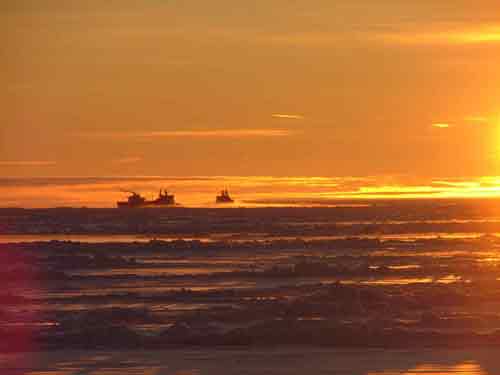 By NED ROZELL August 24, 2005
"This year's ice situation is absolutely unique," said Dmitrenko, an oceanographer and visiting associate professor at the International Arctic Research Center at the University of Alaska Fairbanks. "The Laptev Sea is already open to 81 degrees north. I've never seen that in my life. Usually it's closed to 75 degrees."  Photo by Sergey Kirillov, Arctic and Antarctic Research Institute, Russia.
According to the National Snow and Ice Data Center in Boulder, Colorado, sea ice floating on the Arctic Ocean has decreased in a steady fashion since dependable measurements started in 1978. What's causing the sea ice to melt? Many scientists point to warmer air temperatures in the Arctic, but the pulse of warm Atlantic water Dmitrenko and his coworkers discovered might also be a factor. On a similar Arctic Ocean voyage on a Russian icebreaker in 2004, Dmitrenko gathered information from scientific instruments moored in place in the ocean. Each day, the instruments record vertical profiles of ocean water temperature, as well as salinity and ocean currents. One of those instruments north of the Laptev Sea recorded a jump in water temperature on a February 2004 day as a column of warm water flooded past the instrument, which was between 492 to 1,968 feet (150 and 600 meters) below the ocean surface. That temperature increase, from about 32.7 to 33.4 degrees Fahrenheit (.4 to .8 degree Celsius) is a big change in the stable environment of the Arctic Ocean. Dmitrenko and his colleagues contacted oceanographers in Russia, Norway and Germany to help backtrack the warmer water, and they found it passed Norway in 1998 and took six years to reach the continental slope of the Laptev Sea. That warmer water now resides in the Arctic Ocean, where it will remain for years caught up in currents that swirl counterclockwise in giant undersea basins. During this year's summer school, students from Russia, Canada, America, Belgium, France, Sweden, Denmark and Norway will join researchers and instructors on a 22-day trip aboard an icebreaker on the Laptev Sea portion of the Arctic Ocean. The expedition will depart from Kirkenes, Norway, on September 6. During the trip at sea, college students will work on research projects and help researchers like Dmitrenko retrieve information from moorings that are measuring the ocean's characteristics. Dmitrenko will also install three new moorings to gather more information about the pulse of warm Atlantic water that's entered the Arctic. As his voyage grows closer,
Dmitrenko checks the World Wide Web each day for ice conditions
on the Laptev Sea. He thinks the icebreaker, capable of plowing
through sea ice six-feet-thick, may have an easier time this
year.
Submit A Letter to the Editor
|